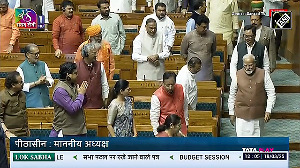Unlike the GOP manifesto where the presence of one of the most influential and powerful Republican Indian Americans who served on the Platform Committee and actively participated in the foreign policy deliberations, transforming the original anemic language on India into substantial declarations, the lack of any Indian American Democrats with even a semblance of gravitas on the Democratic Platform Committee has resulted in the original bland language vis-à-vis India being retained.
The foreign policy component of the National Democratic Platform under the section titled 'Stronger in the World, Safer and More Secure at Home,' in its sub-section 'Strengthening Alliances, Expanding Partnerships, and Reinvigorating International Institutions,' provided to all the delegates attending the Democratic Convention in Charlotte, North Carolina, where US President Barack Obama will be officially re-nominated the Democratic Party's presidential candidate, said, "President Obama has made modernising America's defence posture across the Asia-Pacific a top priority."
"We remain committed to defending and deepening our partnerships with our allies in the region -- Australia, Japan, New Zealand, the Philippines, South Korea, and Thailand," it said, and added, "We will maintain a strong presence in Japan and on the Korean Peninsula to deter and defend against provocations by states like North Korea, while enhancing our presence in Southeast Asia and in Australia."
The platform said, "We will also expand our networks of security cooperation with other emerging partners throughout the region to combat terrorism, counter proliferation, provide disaster relief, fight piracy, and ensure maritime security, including cooperation in the South China Sea."
Then coming to the two lines on India, it said, "And we will continue to invest in a long-term strategic partnership with India to support its ability to serve as a regional economic anchor and provider of security in the broader Indian Ocean region."
Last month, in unprecedented language in the history of the National Republican Platform provided to all the delegates attending the GOP Convention in Tampa, Florida, where erstwhile Massachusetts Governor Mitt Romney was officially anointed the Republican presidential nominee -- the party platform declared that "India is our geopolitical ally and a strategic trading partner."
Also, in the aftermath of the horrific massacre of Sikh worshippers at the gurdwara in Oak Creek, Wisconsin, by white supremacist Wade Michael Page, the platform urged "protection for adherents of all India's religions," and acknowledged "contributions to this country that are being made by our fellow citizens of Indian ancestry."
In the section on South Asia, drafted by the Platform Committee's Subcommittee on Foreign Policy and Defence, chaired by former US Senator Jim Talent, who represented Missouri and is tipped to be the Secretary of Defence if Romney wins the presidency, the platform, said, "We welcome a stronger relationship with the world's largest democracy, India, both economic and cultural, as well as in terms of national security."
"We hereby affirm and declare that India is our geopolitical ally and a strategic trading partner," it said, and added, "We encourage India to permit greater foreign investment and trade."
The platform further stated, "We urge protection for adherents of all India's religions," and declared, "Both as Republicans and as Americans, we note with pride the contributions to this country that are being made by our fellow citizens of Indian ancestry."
This language on US-India relations, the call for protection of Sikh Americans, and an appreciation of the contributions made to the United States by Indian Americans, was in stark contrast to the original bland language the platform had drafted with regard to US relations with India.
The original language had said, "We welcome America's new relationship with India, including the US-India Civil Nuclear Accord," and noted, "Our common security concerns and shared commitment to political freedom and representative government can be the foundation for an enduring partnership."
The major transformation in the language was in large part due to the phenomenal efforts of Hyderabad-born and raised Gopal T K Krishna, 65, the most influential and powerful Indian American Republican in the important caucus state of Iowa, who was the only Indian American on the GOP's policy-making Platform Committee to the Republican National Convention.
While there were two second-generation Indian Americans who served on the Democratic Platform Committee -- California Attorney Pankit Doshi and Shelly Kapoor, also from California -- they did not have any role in the foreign policy deliberations and were also hardly well-versed in the envisaged US-India strategic ties that have been developing exponentially in the last decade.
Meanwhile, on China, the Democratic Platform said, "The president is committed to continuing efforts to build a cooperative relationship with China, while being clear and candid when we have differences."
It said, "The world has a profound interest in the rise of a peaceful and prosperous China, but China must also understand that it must abide by clear international standards and the rules of the road."
The platform said, "China can be a partner in reducing tensions on the Korean Peninsula, countering proliferation in Iran, confronting climate change, increasing trade, and resolving other global challenges."
"President Obama will continue to seek additional opportunities for cooperation with China, including greater communication between our militaries," it said, and pointed out that "we will do this even as we continue to be clear about the importance of the Chinese government upholding international economic rules regarding currency, export financing, intellectual property, indigenous innovation, and workers' rights."
The platform also declared that "we will consistently speak out for the importance of respecting universal human rights of the Chinese people, including the right of the Tibetan people to preserve their cultural and religious identity."
It acknowledged that "we remain committed to a one China policy, the Taiwan Relations Act, and the peaceful resolution of cross-Strait issues that is consistent with the wishes and best interests of the people of Taiwan."
On climate change, the manifesto said, "The national security threat from climate change is real, urgent, and severe," and noted that this was "why the Obama administration has taken a leadership role in ongoing climate negotiations, working to ensure that other major economies like China and India commit to taking meaningful action."
The references to Pakistan in the platform were in the context of the sub-section on "Disrupting, Dismantling, and Defeating Al Qaeda' and another sub-section on 'Responsibly Ending the War in Afghanistan.'
Taking a swipe at the Bush administration, it said that while President George W Bush was obsessed with Iraq, "Osama bin Laden, and Al Qaeda established safe havens across the border from Afghanistan, in Pakistan," and argued that "President Obama's decision to end the Iraq war freed up military and intelligence resources to refocus on this fight and enabled us to shift to a much more effective approach to counterterrorism."
The platform recalled that "as a candidate, then-Senator Obama committed to bringing Osama bin Laden to justice, even it that meant crossing the border into Pakistan," and pointed out that "as a consequence of the President's decision and the brave work of out military and intelligence professionals, bin Laden can no longer threaten the United States and Al Qaeda's senior leadership has been devastated, rendering the group far less capable than it was four years ago."
"The Al Qaeda core in Afghanistan and Pakistan has never been weaker," it added.
With regard to the withdrawal of US troops from Afghanistan, the platform said, "Beyond 2014, we will continue to provide counterterrorism and training assistance and to build an enduring relationship with Afghanistan, as outlined by the US-Afghanistan Strategic Partnership Agreement concluded in May."
But, it said, "We will not build permanent bases in Afghanistan."
"More broadly, we will also continue to support peace and stability in South Asia," and noted that in this regard, "Pakistan can be a partner in that process."
But it made clear to Islamabad that while acknowledging "we respect Pakistan's sovereignty and democratic institutions," that "our interest is in putting and end to Al Qaeda safe havens and respecting Afghan sovereignty," implying that the drone attacks in to Pakistan to pick off terrorist targets enjoying safe havens in Pakistani territory, would continue unabated.
The GOP platform with regard to Pakistan had said that in "the aftermath of the last decade's conflicts in Iraq and Afghanistan has put enormous pressure on the political and military infrastructure of Pakistan, which faces both internal terrorism and external dangers."
It acknowledged that "the working relationship between our two countries is a necessary, though sometimes difficult, benefit to both, and we look toward the renewal of historic ties that have frayed under the weight of international conflict."
The platform also slammed President Obama for announcing a time-table for the withdrawal of US troops from Afghanistan, saying that "future decisions by a Republican president will never subordinate military necessity to domestic politics or an artificial timetable."
"Afghans, Pakistanis, and Americans have a common interest in ridding the region of the Taliban and other insurgent groups, but we cannot expect others to remain resolute unless we show the same determination ourselves," it said.
The GOP platform also took a hefty swipe against the Pakistani spy agency Inter Services Intelligence for its perfidy in sponsoring and supporting terrorist groups, saying, "We must likewise expect the Pakistan government to sever any connection between its security and intelligence forces and the insurgents."
It also said, "No Pakistani citizen should be punished for helping the United States against the terrorists."






 © 2025
© 2025